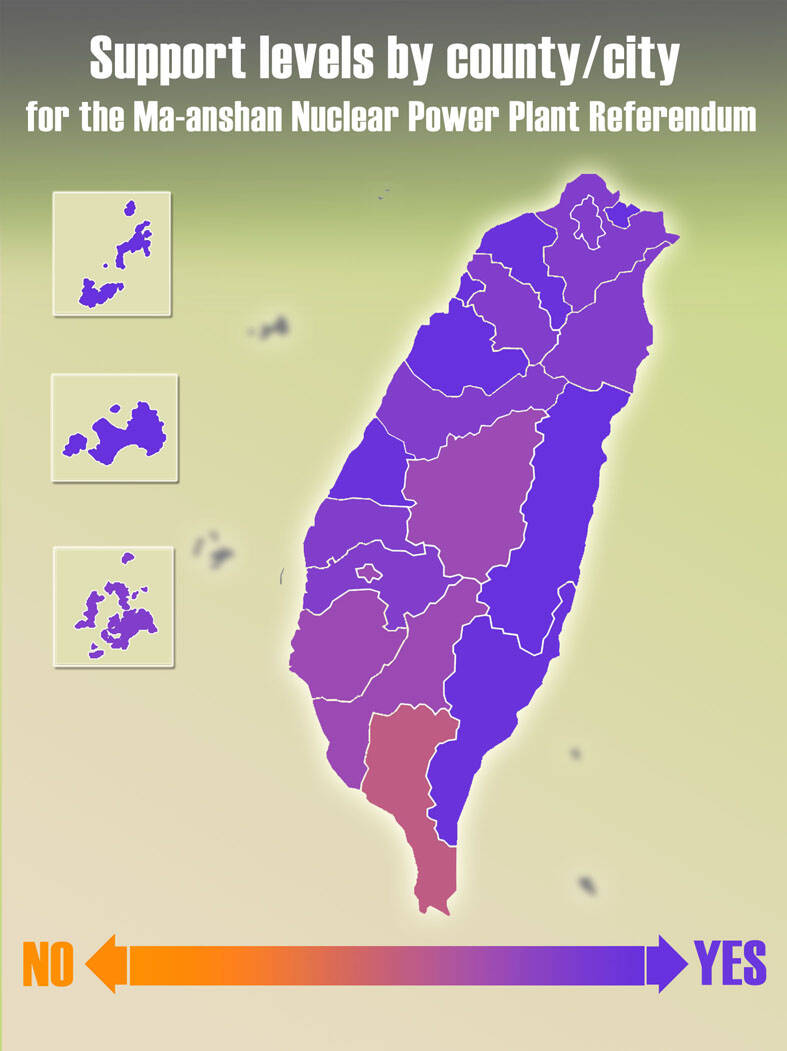Although more than 61 percent of voters in Pingtung County’s Hengchun Peninsula (恆春半島) voted in favor of reactivating the area’s Ma-anshan Nuclear Power Plant on Saturday, there was a general lack of interest in the issue among locals, a long-time observer of Pingtung politics said yesterday.
As the Hengchun Peninsula is home to the power plant, referendum results in the area have been closely watched nationwide.
On the peninsula, 7,211 residents voted in favor of the referendum, 4,103 of which were in Hengchun (恆春), 1,106 in Checheng (車城), 896 in Manjhou (滿州) and 1,106 in Mudan (牡丹) townships.

Of the 4,640 votes against it, 2,658 came from Hengchun, 881 from Checheng, 882 from Manjhou and 219 from Mudan.
In a 2021 referendum to restart the construction of the mothballed Fourth Nuclear Power Plant in New Taipei City’s Gongliao District (貢寮), 6,179 Hengchun Peninsula residents voted “yes,” while 6,728 voted “no.”
In Hengchun Township, 707 more people, or about 21 percent more, voted for Saturday’s referendum compared with the 3,396 in 2021. The number of supporters in the other townships did not show a significant change.
However, the number of residents who voted “no” fell by 40 percent this year, indicating that a majority of residents chose to sit out the referendum.
The Executive Yuan and the opposition parties should focus on improving the economy rather than engaging in conflict, said a senior resident surnamed Chang (張), who has been heavily involved in local elections for nearly 30 years.
Chang said he was not surprised that more people in Hengchun Township supported reactivating the Ma-anshan Nuclear Power Plant, as many residents worked in the plant and felt an attachment to it.
However, Saturday’s referendum was politically charged, as the opposition parties used it to give President William Lai (賴清德) a black eye, he said.
Following a major setback in the July 26 recall elections — in which none of the 24 Chinese Nationalist Party (KMT) up for recall lost their seats — many pan-green camp supporters seemed to have given up on any chance of a better outcome on Saturday, and chose to stay home, he said.
“The Hengchun Peninsula failed to attract many tourists this summer. Lawmakers across party lines have grievances. People have shown great tolerance for the ruling Democratic Progressive Party by not voting,” he said.

The Taipei Mass Rapid Transit (MRT) Wanda-Zhonghe Line is 81.7 percent complete, with public opening targeted for the end of 2027, New Taipei City Mayor Hou You-yi (侯友宜) said today. Surrounding roads are to be open to the public by the end of next year, Hou said during an inspection of construction progress. The 9.5km line, featuring nine underground stations and one depot, is expected to connect Chiang Kai-shek Memorial Hall Station to Chukuang Station in New Taipei City’s Jhonghe District (中和). All 18 tunnels for the line are complete, while the main structures of the stations and depot are mostly finished, he

The first global hotel Keys Selection by the Michelin Guide includes four hotels in Taiwan, Michelin announced yesterday. All four received the “Michelin One Key,” indicating guests are to experience a “very special stay” at any of the locations as the establishments are “a true gem with personality. Service always goes the extra mile, and the hotel provides much more than others in its price range.” Of the four hotels, three are located in Taipei and one in Taichung. In Taipei, the One Key accolades were awarded to the Capella Taipei, Kimpton Da An Taipei and Mandarin Oriental Taipei. Capella Taipei was described by

Minister of Economic Affairs Kung Ming-hsin (龔明鑫) yesterday said that private-sector refiners are willing to stop buying Russian naphtha should the EU ask them to, after a group of non-governmental organizations, including the Centre for Research on Energy and Clean Air (CREA), criticized the nation’s continued business with the country. While Taiwan joined the US and its Western allies in putting broad sanctions on Russia after it invaded Ukraine in 2022, it did not explicitly ban imports of naphtha, a major hard-currency earner for Russia. While state-owned firms stopped importing Russian oil in 2023, there is no restriction on private companies to

President William Lai (賴清德) is expected to announce a new advanced “all-domain” air defense system to better defend against China when he gives his keynote national day speech today, four sources familiar with the matter said. Taiwan is ramping up defense spending and modernizing its armed forces, but faces a China that has a far larger military and is adding its own advanced new weapons such as stealth fighter jets, aircraft carriers and a huge array of missiles. Lai is expected to announce the air defense system dubbed “Taiwan Dome” in his speech this morning, one of the sources said. The system